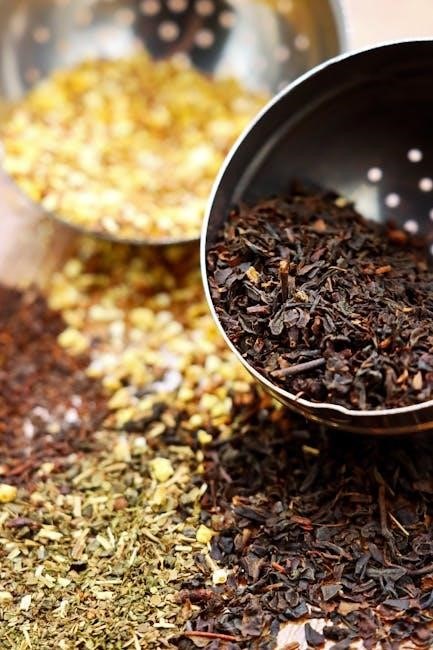Anti-inflammatory foods are essential for reducing chronic inflammation, which can prevent diseases like heart disease, diabetes, and depression. Incorporating these foods into your diet promotes overall well-being and mental health. Download a free anti-inflammatory foods list PDF to guide your grocery shopping and meal planning.
1.1 What Are Anti-Inflammatory Foods?
Anti-inflammatory foods are nutrient-rich options that help reduce inflammation in the body. They include fruits, vegetables, whole grains, fatty fish, nuts, seeds, legumes, spices, and healthy oils. These foods are high in antioxidants, omega-3 fatty acids, and fiber, promoting overall health and well-being.
1.2 Importance of Reducing Inflammation
Chronic inflammation can lead to serious health issues like heart disease, diabetes, and mental health disorders. Reducing inflammation through diet helps protect against these conditions, promoting long-term health and improving overall quality of life.
1.3 Benefits of an Anti-Inflammatory Diet
An anti-inflammatory diet reduces chronic inflammation, improving heart health, mental well-being, and overall longevity. It helps prevent diseases like diabetes and cancer while promoting a stronger immune system and healthier digestion. Incorporating anti-inflammatory foods supports a balanced lifestyle and enhances energy levels.

Understanding Inflammation
Inflammation is the body’s natural defense against harm, but chronic inflammation can lead to serious health issues. It occurs in two forms: acute (short-term) and chronic (long-term), impacting overall well-being and disease risk.
2.1 Acute vs. Chronic Inflammation
Acute inflammation is a short-term, beneficial response to injury or infection, resolving quickly. Chronic inflammation, however, is prolonged and harmful, lasting months or years, leading to conditions like heart disease and diabetes, and negatively impacting mental health by increasing anxiety and depression risks.
2.2 Causes of Chronic Inflammation

Chronic inflammation stems from factors like poor diet, obesity, stress, and infections. A diet high in processed foods, sugary snacks, and red meats exacerbates inflammation. Additionally, lack of exercise and environmental toxins contribute to prolonged inflammation, increasing the risk of chronic diseases like heart disease and mental health disorders.
2.3 Health Risks Associated with Chronic Inflammation
Chronic inflammation is linked to serious health risks, including heart disease, diabetes, and cancer. It also contributes to mental health issues like anxiety and depression. Prolonged inflammation can damage tissues and organs, emphasizing the importance of dietary changes to reduce its harmful effects.

The Anti-Inflammatory Foods List
This comprehensive guide includes a variety of fruits, vegetables, whole grains, fatty fish, nuts, seeds, and spices. It’s organized into categories for easy reference and shopping. Download the PDF for a quick, convenient resource to reduce inflammation.
3.1 Fruits
Fruits like berries, apples, and citrus are rich in antioxidants and fiber, reducing inflammation. Include cherries, oranges, and lemons in your diet for their anti-inflammatory properties and immune-boosting benefits. These fruits support overall health and mental well-being effectively.
3.2 Vegetables
Leafy greens like kale, spinach, and broccoli are packed with antioxidants and fiber, reducing inflammation. Include colorful vegetables such as bell peppers and carrots to support immune function and overall health. These vegetables are key components of an anti-inflammatory diet.
3.3 Proteins and Fatty Fish
Fatty fish like salmon, mackerel, and sardines are rich in omega-3 fatty acids, which combat inflammation. Incorporate lean proteins such as chicken and turkey and plant-based options like tofu and lentils for a balanced and anti-inflammatory diet.
3.4 Whole Grains
Whole grains like quinoa, oats, and barley are rich in fiber and antioxidants, which help reduce inflammation. They provide sustained energy and support overall health. Incorporate them into meals to enhance your anti-inflammatory diet and improve digestion.
3.5 Nuts, Seeds, and Healthy Fats
Nuts like walnuts and almonds, seeds such as chia and flaxseeds, and healthy fats like avocado oil and olive oil are rich in omega-3s and antioxidants. They reduce inflammation, support heart health, and provide essential nutrients for optimal well-being. Include them in snacks or meals for added benefits.
Spices like turmeric (with curcumin), ginger, and cinnamon, along with herbs such as rosemary and garlic, have potent anti-inflammatory properties. They enhance flavor naturally and are versatile additions to meals, providing both culinary and health benefits. Incorporate them into your recipes for a healthy, flavorful diet. Fermented foods like kimchi, sauerkraut, kefir, and yogurt are rich in probiotics, which support gut health and reduce inflammation. These foods boost the immune system and promote a balanced microbiome, aiding in overall well-being and digestion. Include them in your diet for enhanced anti-inflammatory benefits. Anti-inflammatory beverages include green tea, black tea, and coffee, which are rich in antioxidants. Water is essential for hydration, while dark chocolate and kombucha offer additional anti-inflammatory properties. These drinks help reduce inflammation and support overall health when consumed as part of a balanced diet. Certain foods can trigger inflammation, such as processed foods, sugary snacks, and red meats. Limiting these items helps reduce inflammation and promotes a healthier diet. Always refer to your anti-inflammatory foods list PDF for guidance. Processed foods, such as packaged snacks, frozen meals, and fast food, are high in unhealthy fats, sugars, and sodium. These items can trigger inflammation and increase the risk of chronic diseases. Limiting processed foods is crucial for maintaining a balanced, anti-inflammatory diet. Always check your anti-inflammatory foods list PDF for guidance. Sugary drinks and snacks, like sodas and pastries, contribute to inflammation. High sugar intake can lead to chronic inflammation, increasing risks of heart disease and diabetes. Reducing these items and referring to your anti-inflammatory foods list PDF helps maintain a healthier diet and reduces inflammation risks. Red and processed meats, such as bacon and sausages, are linked to chronic inflammation. They contain advanced glycation end (AGE) products and preservatives that can trigger inflammation. Limiting these foods, as suggested in your anti-inflammatory foods list PDF, helps reduce inflammation and improves overall health. Fried foods, like french fries and doughnuts, are high in unhealthy fats and calories, promoting inflammation. They can lead to chronic inflammation, increasing the risk of diseases. Avoiding fried foods, as recommended in your anti-inflammatory foods list PDF, supports a healthier diet and reduces inflammation risks. Key nutrients like omega-3 fatty acids, antioxidants, fiber, and polyphenols play a crucial role in reducing inflammation. These nutrients, found in anti-inflammatory foods, help combat chronic inflammation and support overall health. Refer to your anti-inflammatory foods list PDF for detailed guidance. Omega-3 fatty acids are potent anti-inflammatory nutrients found in fatty fish, nuts, and seeds. They help reduce chronic inflammation, support heart health, and may improve brain function. Include sources like salmon, walnuts, and flaxseeds in your diet to maximize their benefits. Refer to your anti-inflammatory foods list PDF for more details. Antioxidants play a crucial role in combating inflammation by neutralizing free radicals. Found in fruits, vegetables, and dark chocolate, they protect cells from oxidative stress. Include antioxidant-rich foods like berries, leafy greens, and nuts in your meals to enhance their anti-inflammatory effects. Check your anti-inflammatory foods list PDF for more options. Fiber supports gut health, which is linked to reduced inflammation. Foods like whole grains, fruits, and vegetables are rich in fiber, promoting a balanced gut microbiome. A high-fiber diet can help lower inflammatory markers, improving overall health. Refer to your anti-inflammatory foods list PDF for fiber-rich options. Polyphenols are powerful antioxidants found in foods like berries, green tea, and dark chocolate. They help combat oxidative stress and inflammation by neutralizing free radicals. Including polyphenol-rich foods in your diet can enhance anti-inflammatory effects. Check your anti-inflammatory foods list PDF for polyphenol-rich options. Start your day with a nutrient-rich breakfast, incorporate healthy snacks, and plan balanced meals using your anti-inflammatory foods list PDF as a guide for easy, sustainable changes. Begin with a nutrient-packed breakfast featuring anti-inflammatory foods. Try oatmeal topped with berries, nuts, and a drizzle of honey, or a smoothie blending spinach, bananas, and chia seeds. Avocado toast on whole-grain bread with a poached egg is another delicious option to kickstart your day. For lunch, try a grilled salmon salad with mixed greens, cherry tomatoes, and olive oil. Dinner options include stir-fried vegetables with turmeric and ginger, served over quinoa, or a hearty lentil soup with spinach and aromatic spices. These meals are both nourishing and flavorful. Opt for anti-inflammatory snacks like mixed nuts, fresh berries, or avocado slices on whole-grain toast. Dark chocolate (70% cocoa) and trail mixes with chia seeds are also great choices. These snacks provide essential nutrients and help maintain a balanced, inflammation-reducing diet throughout the day. The Mediterranean diet, emphasizing fruits, vegetables, whole grains, and healthy fats like olive oil, is renowned for its anti-inflammatory benefits. It includes fatty fish, herbs, and spices, promoting overall health. Download the anti-inflammatory foods list PDF for more details. The Mediterranean diet focuses on whole grains, fruits, vegetables, legumes, nuts, seeds, and healthy fats like olive oil. It also includes moderate amounts of dairy, eggs, and red wine, with an emphasis on fatty fish and herbs for added anti-inflammatory benefits. A PDF list details these components. The Mediterranean diet reduces chronic inflammation, improves heart health, and supports mental well-being. It emphasizes anti-inflammatory foods, promoting long-term health benefits and disease prevention. This dietary pattern is widely recognized for its holistic approach to nutrition and is often included in anti-inflammatory foods list PDF guides. Start with oatmeal topped with berries and walnuts. For lunch, enjoy a salad with grilled salmon, olives, and olive oil. Dinner could feature roasted vegetables like broccoli and sweet potatoes, served with quinoa. Snacks include nuts, seeds, and fresh fruit, aligning with the anti-inflammatory foods list PDF. A handy guide categorizing anti-inflammatory foods, including fruits, vegetables, proteins, and grains, to simplify grocery shopping and meal planning. Download the anti-inflammatory foods list PDF for easy reference. Print the anti-inflammatory foods list PDF and organize your shopping by categories like fruits, vegetables, and proteins. Check off items as you shop and use it to plan balanced meals. This guide simplifies incorporating anti-inflammatory foods into your daily diet for optimal health benefits. The anti-inflammatory foods list PDF is divided into categories like fruits, vegetables, proteins, whole grains, nuts, and spices. This organization makes it easy to plan meals and shop efficiently, ensuring you never miss essential items for an anti-inflammatory diet. Chronic inflammation is linked to mental health issues like anxiety and depression. An anti-inflammatory diet rich in antioxidants and omega-3s can help reduce symptoms and support mental well-being. Research shows chronic inflammation is closely tied to mental health disorders. Elevated inflammatory markers can trigger conditions like depression and anxiety. A diet rich in anti-inflammatory foods, as outlined in the anti-inflammatory foods list PDF, helps reduce inflammation, promoting mental well-being and emotional resilience. Foods like berries, walnuts, and fatty fish are rich in antioxidants and omega-3s, which support brain health. Including these in your diet, as detailed in the anti-inflammatory foods list PDF, can enhance mental clarity and reduce symptoms of anxiety and depression, fostering a healthier mind. Frequently asked questions about anti-inflammatory foods include their effectiveness for everyone, how quickly results can be seen, and potential side effects. Refer to the anti-inflammatory foods list PDF for more details. While anti-inflammatory foods benefit most people, individual responses vary. Factors like metabolism, health conditions, and diet consistency influence effectiveness. Consulting a healthcare provider or dietitian can help tailor the diet to personal needs, ensuring optimal results from the anti-inflammatory foods list PDF. Results from an anti-inflammatory diet vary, but some may notice improvements in energy and reduced inflammation within weeks. Consistency is key, as long-term benefits like improved mental health and chronic disease prevention often require months of adherence to the anti-inflammatory foods list PDF. Adopting an anti-inflammatory diet is generally safe, but some may experience digestive changes due to increased fiber intake. Transitioning gradually and consulting a healthcare provider can minimize side effects. The anti-inflammatory foods list PDF guides a balanced approach to avoid potential discomfort. Adopting an anti-inflammatory diet can significantly improve your health and reduce chronic inflammation risks. Use the anti-inflammatory foods list PDF to guide your journey and enjoy long-term well-being with delicious, nutritious meals. Starting an anti-inflammatory diet is a proactive step toward better health. With the anti-inflammatory foods list PDF, you can easily identify and incorporate beneficial foods. Small dietary changes can lead to significant improvements in both physical and mental well-being, making it worth the effort to begin today.3.6 Spices and Herbs
3.7 Fermented Foods
3.8 Beverages

Foods to Avoid
4.1 Processed Foods
4.2 Sugary Drinks and Snacks
4.3 Red and Processed Meats
4.4 Fried Foods

The Role of Specific Nutrients
5.1 Omega-3 Fatty Acids
5.2 Antioxidants
5.3 Fiber
5.4 Polyphenols
Incorporating Anti-Inflammatory Foods into Your Diet
6.1 Breakfast Ideas
6.2 Lunch and Dinner Recipes
6.3 Snacking Options

The Mediterranean Diet
7.1 Key Components
7.2 Benefits of the Mediterranean Diet
7.3 Sample Meal Plan
Printable Anti-Inflammatory Foods List PDF

8.1 How to Use the PDF
8.2 Categories for Easy Shopping

Mental Health and Inflammation
9.1 Link Between Inflammation and Mental Health
9.2 Foods That Support Mental Well-being
FAQs About Anti-Inflammatory Foods
10.1 Do Anti-Inflammatory Foods Work for Everyone?
10.2 Can I See Results Quickly?
10.3 Are There Any Side Effects?
11.1 Summary of Key Points
11.2 Encouragement to Start an Anti-Inflammatory Diet
